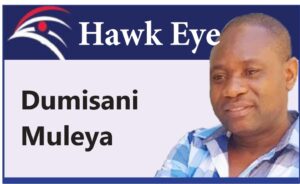
THE arrest of Zimbabwean freelancer Jeffrey Moyo, who writes for the New York Times and Canada’s Globe and Mail newspaper, is one in a series of repressive measures by President Emmerson Mnangagwa’s government to silence critical journalists.
When Mnangagwa came to power through a coup in 2017, he promised a clean break with the past. While many Zimbabweans believed him – at their own risk, of course – some of us refused to be hoodwinked by the late former president Robert Mugabe’s best student and enforcer of his failed authoritarian rule.
It was as clear as an azure sky of deepest summer that nothing will change, except for the worse.
For only the captain of the ship had been removed, but the whole ship crew had remained. If the remaining crew tried to change things, the whole ramshackle, which can’t be fixed, would sink.
And, more troubling, the ship would remain sailing in the same direction to nowhere. No sooner had the new captain taken over the stewardship than he found himself at sea; not knowing where he was sailing.
It became a case of groping in the dark, with Mnangagwa behaving like a drunkard who loses his car keys on the dark side of the road only to spend hours looking for them in vain on the side where there is light, as Jonathan Moyo would say.
Now there has been a serious democratic backslide to authoritarianism, stalling Zimbabwe’s arrested political transition and development.
So the arrest of the reporter on May 26 in the capital, Harare, on charges of violating Section 36 of the Immigration Act for alleged misrepresentations to immigration officials of the accreditation status of two journalists from the New York Times is further evidence nothing has changed. If anything, it’s now worse in many respects as incredible as it may sound.
According to Moyo’s lawyer Douglas Coltart, the New York Times journalists – Christina Goldbaum and Joao Silva – had arrived in Zimbabwe through Bulawayo from South Africa on 5 May.
However, they were deported on 8 May because they allegedly did not have proper accreditation from the Zimbabwe Media Commission (ZMC).
While journalists, like any other citizens, must be held accountable for their actions if they break the law, this is one in many examples of harassment of journalists.
“Zimbabwean authorities must immediately release journalist Jeffrey Moyo (pictured), who should never have been detained, let alone charged,” said Angela Quintal, Committee to Protect Journalist (CPJ) Africa programme coordinator.
“The fact that he was arrested, and his New York Times colleagues forced to leave the country, shows that Zimbabwe continues to violate the right to press freedom and the public’s right to know.”
New York Times spokesperson Nicole Taylor, in a statement emailed to CPJ just after publication, said, “We are deeply concerned by Jeffrey Moyo’s arrest and are assisting his lawyers to secure his timely release. Jeffrey is a widely respected journalist with many years of reporting experience in Zimbabwe and his detainment raises troubling questions about the state of press freedom in Zimbabwe.”
Moyo was transferred from Harare and then appeared in the magistrate’s court in Bulawayo, along with his co-accused, ZMC official Thabang Manhika, where they were denied bail.
After that it took a whole week for the magistrate to produce a written ruling – it was only produced when Coltart escalated the issue – thus delaying the appeal process and keeping Moyo held in the cells.
Lasts year investigative filmmaking journalist Hopewell Chin’ono was arrested several times on frivolous grounds.
Although authorities did not admit it, they were punishing him for exposing Covid-19-related corruption under the pretext that he was an activist – as if that is a crime anyway even if it were to be true – and was plotting public violence.
Chin’ono was detained for lengthy periods, including a stretch of 45 days at one time.
Online journalist Mduduzi Mathuthu, ZimLive editor, was hounded. His nephew Tawanda Mucheiwa was abducted and tortured for three days.
This is the sort of media tyranny that prevailed during Mugabe’s disastrous rule.
But the same repression and impunity continue without reprieve under Mnangagwa who is not just following on his mentor’s footsteps, but also pushing the envelope of despotism against journalists and Zimbabweans in general.